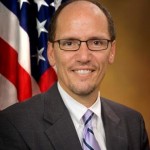 Thomas E. Perez, assistant attorney general for the civil rights division of the US Justice Department, had a clear and firm message when he visited Marquette University Law School on Friday: He’s aiming to do the job he has held since October energetically and thoroughly.
Thomas E. Perez, assistant attorney general for the civil rights division of the US Justice Department, had a clear and firm message when he visited Marquette University Law School on Friday: He’s aiming to do the job he has held since October energetically and thoroughly.
That wouldn’t seem like a noteworthy statement, except for the political context of Perez’ situation and the controversies that attend many of the areas of enforcement in the civil rights division.
Perez said he would prefer to be like “the proverbial Maytag man,” sitting around with no one needing his services. But that is hardly how he described the work load of his division.
Perez spent almost all of his remarks, lasting about a half hour, defending the need for civil rights enforcement in today’s America and pointedly hitting the theme that the division is “open for business.”
“We’ve got a lot to do, and we had a lean eight years from ’01 to ’09,” Perez said, a reference to the administration of President George W. Bush, whose record on civil rights enforcement was strongly criticized by civil liberties groups.
Perez said that while the United States has made great strides toward improving the climate for civil rights, he does not agree at all with some who argue that the free market can deal with discrimination or that the need for federal enforcement has waned.
“We need laws against discrimination in order to ensure a functioning economy,” he said. He said discrimination is still a reality in education, employment, lending, and law enforcement, among other arenas.
“An unfettered market is not always good for America,” he said, citing cases such as discrimination in home lending and hiring. He said even defenders of free market forces such as the Hon. Richard Posner of the US Court of Appeals for the Seventh Circuit had come to recognize that “the unfettered market is not working for everyone.”
Perez recounted the cases brought by the civil rights division last week, which he called :”retro week” because some of the cases, such as an educational opportunity case in Louisiana, involved the kind of discrimination some people think no longer occurs. He said there continues to be both “discrimination with a smile,” done in subtle ways, such as in steering people toward or away from housing because of their race, and discrimination that is asovert and hostile as there was in the pre-civil rights era.
“We are, indeed, open for business,” he said as he concluded the list of recent cases.
“We still have along way to go in Milwaukee and we still have a long way to go in this country” to reach the dream of equal justice under law advocated by Dr. Martin Luther King Jr., Perez said.
Perez spoke to about 40 people, many of them attorneys from organizations with specific interests in the issues he deals with. He also took questions for about a half hour. The visit was among several he made in the Milwaukee area on Friday.
Perez was deputy assistant attorney general for civil rights under Attorney General Janet Reno during the Clinton administration and has worked in numerous other government positions and as a law professor. A local note: he is married Ann Marie Staudenmaier, an attorney with the Washington Legal Clinic for the Homeless, whose parents live in the Milwaukee area.
